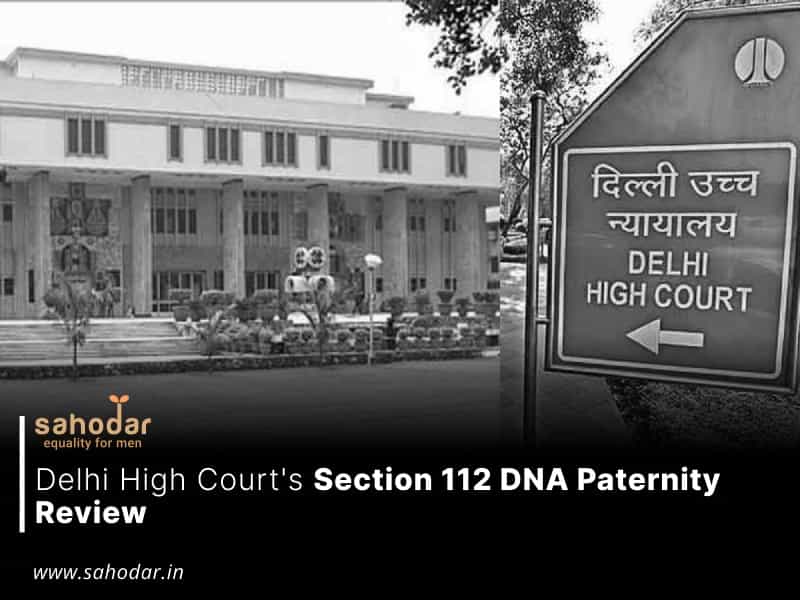Section 112 of the Evidence Act underscores the principle that children born within the confines of a legally recognized marriage are deemed legitimate per se and it ensures that no unwarranted assumptions of impropriety or moral transgressions are made and instead places the burden of proof on those who contest the child’s legitimacy.
In the Delhi High Court, a petition was submitted under Section 482 of the Criminal Procedure Code, seeking the quashing of a judgment rendered on 20-03-2019 by the District and Sessions Judge of the South-East District, Saket, Delhi. This judgment affirmed the decision of the Metropolitan Magistrate of Saket regarding a child’s maintenance claim. The child in question was born during the subsistence of the petitioner’s marriage to the first respondent. The Honorable Justice Swarana Kanta Sharma upheld the impugned order, primarily relying on the results of a DNA test, which unequivocally established that the first respondent was not the biological father of the child.
The petitioner, a former domestic aide employed at the respondents’ residence from February 2013 to February 2016, alleged that the first respondent had coerced her into non-consensual sexual relations, proffering false promises of matrimony as inducement. Furthermore, the petitioner asserted that she was compelled to engage in sexual activities with two associates of the first respondent, initially resisting but succumbing to such actions due to the threat of marriage.
Subsequently, the petitioner and the first respondent entered into matrimony on 02-03-2016, and notably, the petitioner gave birth to a child on 01-04-2016, a duration of less than one month post-marriage. On 14-07-2016, the petitioner initiated legal proceedings under Section 12 of the Protection of Women from Domestic Violence Act, 2005 (DV Act) against the respondents, seeking interim maintenance. In response, the respondents requested a DNA test to determine the child’s parentage, a request that was granted. However, the Magistrate denied the maintenance claim, citing the petitioner’s alleged concealment of her income. Subsequently, an appeal was filed with the Sessions Court, leading to the petitioner’s application to quash the orders issued by the Magistrate and the Sessions Court, dated 01-12-2017 and 20-03-2019, respectively.
With regard to the application of the presumption delineated under Section 112 of the Indian Evidence Act, the petitioner contended that this presumption should be invoked when a child is born within the confines of a legally recognized marriage. The court observed that Section 112 of the Evidence Act necessitates the establishment of a valid marriage between the child’s mother and another individual to definitively establish the child’s legitimacy in relation to the mother’s spouse. Notably, the sole recognized avenue to challenge the otherwise inviolable presumption under Section 112 is by demonstrating non-access.
In the context of employing a DNA test to contest the presumption under Section 112 of the Evidence Act, the court underscored that the onus of proving non-access rested with the party asserting it. The proffered evidence needed to be substantial, unambiguous, compelling, and conclusive, surpassing the threshold of a mere preponderance of probabilities.
The court duly recognized that the DNA test was conducted in accordance with a court order and faced no opposition. The DNA test report unequivocally established that the first respondent was not the biological father of the petitioner’s child. Consequently, the protection afforded under Section 112 of the Evidence Act would have been applicable only in the absence of the conducted DNA test. The court underscored the legislative intent behind the enactment of Section 112 of the Evidence Act, which is to shield every child from the ignominy of being branded as “illegitimate” and to extend the mantle of legitimacy by invoking the presumption under Section 112 in favor of a child’s legitimacy when born during the subsistence of a valid marriage.
Based on the findings of the DNA test, the court concluded that the first respondent was not the biological father of the petitioner’s child, leading to the denial of child maintenance. However, since the existence of the marriage between the parties was not disputed (although its legality was contested and pending resolution in the relevant court of law), the court determined that the trial court had erred in denying maintenance to the petitioner at that stage. Consequently, the case was remitted for a fresh assessment of the maintenance quantum to be awarded to the petitioner.

